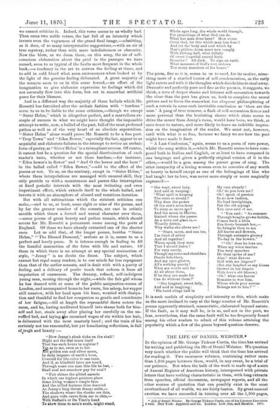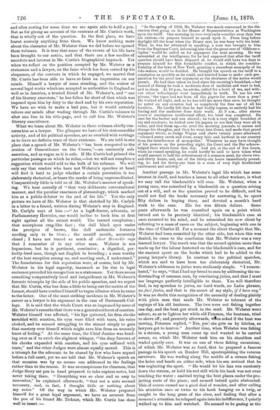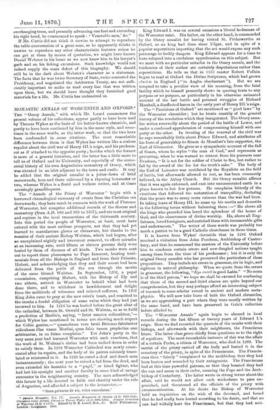THE LIFE OF DANIEL WEBSTER.*
IN the opinion of Mr. George Ticknor Curtis, the time has arrived for writing and publishing the life of Daniel Webster. We question very much whether the public will think that the time has arrived for reading it. Two enormous volumes, containing rather more than 1,300 pages between them, would, in any event, be a trial of our patience. But when the bulk of the work is made up of a sort of Annual Register of American history, interspersed with private letters that have nothing characteristic in them, with long extracts from speeches, official documents, newspaper reports, and all the other sources of quotation that can possibly exist in the most overburdened of all worlds, we are fairly beaten. By great manual exertion we have succeeded in turning over all the 1,300 pages,
* Life of Daniel Wager. By George Ticknor Curtis, one of his Literary Executors. 2 vols. New York: Appleton and Co. London: Low, Bon, and Marston. 1870.
and after resting for some time we are again able to hold a pen. But as for giving an account of the contents of Mr. Curtis's work, that is wholly out of the question. In the first place, we have learnt scarcely anything from them. We know nothing more about the character of Mr. Webster than we did before we opened these volumes. It is true that some of the events of his life have been brought to our notice, and that there are a few needles of anecdote and interest in Mr. Curtis's biographical haystack. Yet when we reflect on the position occupied by Mr. Webster as a statesman and a lawyer, on the fame which has been earned by his eloquence, of the contests in which he engaged, we marvel that Mr. Curtis has been able to leave so faint an impression on our minds. Himself a lawyer of some standing, and the author of several legal works which are accepted as authorities in England as well as in America, a trusted friend of Mr. Webster's, and " one of his literary executors," he has fallen far short of that which was imposed upon him by duty to the dead and by his own reputation. We have no wish to make a bad pun, but it would certainly relieve our minds after wading through Mr. Curtis's volumes to alter one line in his title-page, and to call him Mr. Webster's literary executioner.
What we learn about Mr. Webster in these volumes chiefly con- cerns him as a lawyer. The glimpses we have of his statesmanlike activity, and of his political speeches, are so overlaid with verbiage as to leave no definite trace of their existence. We are told in one place that a speech of Mr. Webster's " has been compared to the oration of Demosthenes on the Crown,"—an eminently safe assertion, and as vague as it is safe. If Mr. Curtis had printed the particular passages on which he relies,—but we will not complete a suggestion which would add to the bulk of his volumes. We will only say that readers who have not Webster's speeches at hand will find it hard to judge whether a certain peroration is too elaborately rhetorical, or bears the marks of being unpremeditated. Comparatively little is told us of Mr. Webster's manner of speak- ing. We hear casually of " that very deliberate conversational manner, and the peculiar exactness of phraseology, which marked him as a public debater to the end of his life." Yet the only picture we have of Mr. Webster is that sketched by Mr. Carlyle in a letter to a friend, written during Webster's stay in England. Mr. Carlyle says of him :—" As a login-fencer, advocate, or Parliamentary Hercules, one would incline to back him at first sight against all the extant world. The tanned complexion ; that amorphous crag-like face ; the dull black eyes under the precipice of brows, like dull anthracite furnaces needing only to be blown ; the mastiff mouth, accurately closed ; I have not traced so much of silent Berserkir rage that I remember of in any other man. Webster is not loquacious, but he is pertinent, conclusive ; a dignified, per- fectly-bred man, though not English in breeding ; a man worthy of the best reception among us, and meeting such, I understand." The foundations for this reputation were, of course, laid by Mr. 'Webster in his legal capacity, inasmuch as his rise to legal eminence preceded his recognition as a statesman. Yet there seems something comparatively local and insignificant in Mr. Webster's forensic triumphs by the side of his public speeches, and we regret that Mr. Curtis, who has done a little to bring out the merits of the former, should have confined himself to vague allusion when he came to the latter. One of the most striking incidents in Mr. Webster's career as a lawyer is his argument in the case of Dartmouth Col- lege. It is said that the whole Court was so impressed by some of Mr. Webster's remarks that there was a general outburst of emotion. Webster himself was affected, " his lips quivered, his firm cheeks trembled with emotion, his eyes were filled with tears, his voice choked, and he seemed struggling to the utmost simply to gain that mastery over himself which might save him from an unmanly burst of feeling." At the same time, the Chief Justice was bend- ing over as if to catch the slightest whisper, "'the deep furrows of his cheeks expanded with emotion, and his eyes suffused with tears;" and the other Judges were almost equally moved. This is a triumph for the advocate to be shared by few who have argued before a full court, yet we are told that Mr. Webster's speech on that occasion was by no means one addressed to the feelings rather than to the reason. It was so conspicuous for clearness, that Judge Story sat pen in hand prepared to take copious notes, but never taking them. " Everything was so clear and so easy to remember," he explained afterwards, " that not a note seemed necessary, and, in fact, I thought little or nothing about my notes." Of the way in which Mr. Webster prepared himself for a great legal argument, we have an account from the pen of his friend Mr. Ticknor, which Mr. Curtis has done well to insert :— "In the spring of 1824, Mr. Webster was much concerned in the dis- cussion then going on in the House of Representatives at Washington upon the tariff. One morning he rose very early—earlier even than was his custom—to prepare himself to speak upon it. From long before daylight till the hour when the House met, he was busy with his brief. When he was far advanced in speaking, a note was brought to him from the Supreme Court, informing him that the great case of Gibbons v. Ogden ' would be called on for argument the next morning. He was astounded at the intelligence, for he had supposed that after the tariff question should have been disposed of, he would still have ten days to prepare himself for this formidable conflict, in which the constitu- tionality of the laws of New York, granting a steamboat monopoly of its tide-waters, would be decided. He brought his speech on the tariff to a conclusion as speedily as he could, and hurried home to make such pre- paration for the great law argument as the shortness of the notice would permit. He had then taken no food since his morning's breakfast,—but instead of dining he took a moderate dose of medicine and went to bed, and to sleep. At 10 p.m., he awoke, called for a bowl of tea, and with- out other refreshment went immediately to work. To use his own phrase, ' the tapes had not been off the papers for more than a year.' He worked all night, and, as he has told me more than once, he thought ho never on any occasion had so completely the free use of all his faculties. He hardly felt that he had bodily organs, so entirely had his fasting and the medicine done their work. At 9 a.m., after eleven hours of continuous intellectual effort, his brief was completed. He sent for the barber and waa shaved ; he took a very alight breakfast of tea and crackers ; he looked over his papers to see that they were all in order, and tied them up,—he read the morning journals, to amuse and change his thoughts, and then ho went into Court, and made that grand argument which, as Judge Wayne said above twenty years afterward, 'released every creek and river, every lake and harbour in our country from the interference of monopolies.' Whatever he may have thought of his powers on the preceding night, the Court and the Bar acknow- ledged their whole force that day. And yet, at the end of five hours, when he ceased speaking, he could hardly be said to have taken what would amount to half the refreshment of a common meal, for above two- and-thirty hours, and, out of the thirty-six hours immediately preced- ing, he had for thirty-ono been in a state of very high ibtelleetnal excitement and activity."
Another passage in Mr. Webster's legal life which has some interest in itself, and teaches a lesson to all other workers, is what we may call the blacksmith's will case. Mr. Webster, when a young man, was consulted by a blacksmith on a question arising out of a will, and as the question proved to be difficult, and he could not find the books necessary for answering it, he spent fifty dollars in buying them, and devoted a month's hard work to the case. His fee was fifteen dollars. Some years afterwards he was consulted again on a point which turned out to be precisely identical ; his blacksmith's case at once recurred to his mind, and he astonished his new client by referring to a mass of cases on the subject, beginning with one in the time of Charles II. For a moment the client thought that Mr. Webster had been consulted by the other side, but when this was
denied, he came to the conclusion that Mr. Webster was a very learned lawyer. The result was that the second opinion more than made up for the labour bestowed on the blacksmith's case, and for the amount spent on the books which had to be added to the young lawyer's library. In contrast to the political speeches, which are said to have been too elaborately rhetorical, Mr. Webster's addresses to juries were studiously simple. " I remem- bered," he says, "that I had my bread to earn by addressing the un- derstanding of common men, by convincing juries, and that I must use language perfectly intelligible to them. You will therefore find, in my speeches to juries, no hard words, no Latin phrases, no fieri facies, and that is the secret of my style, if I have any." It was no doubt this recognition of the necessity of dealing plainly with plain men that made Mr. Webster so tolerant of the sayings of his old boatman. The two were out fishing together one day, and the boat got stuck in the mud. Mr. Webster went ashore, so as to lighten her while old Peterson, the boatman, tried to shove off; and presently afterwards, witen asked if the boat was moving, Peterson replied, " Yes, yes! she gets on by hitches, as lawyers get to heaven." Another time, when Webster was fishing in a stream, a young man came up and wanted to be carried across, on which Mr. Webster took him on his shoulders and waded quietly over. It was on one of these fishing excursions, of which Mr. Webster was so fond, that he prepared a famous passage in his speech on Bunker Hill, apostrophizing the veteran survivors. He was wading along the middle of a stream fishing the holes and bends on either side, when his son noticed that he was neglecting the sport. " He would let his line run carelessly down the stream, or hold his rod still while his hook was not even touching the water ; omitted trying the best places under the pro-
jecting roots of the pines ; and seemed indeed quite abstracted. This of course caused me a good deal of wonder, and after calling his attention once or twice to his hook hanging on a twig, or
caught in the long grass of the river, and finding that after a moment's attention he relapsed again into his indifference, I quietly walked up to 'him and watched. He seemed to be gazing at the
overhanging trees, and presently advancing one foot and extending his right hand, he commenced to speak : ' Venerable men,' &c."
If Mr. Curtis did not think it unwise to attempt to reproduce the table conversation of a great man, as he apparently thinks it unwise to reproduce any other characteristic features unless he can get at them by means of quotation, we might have known Daniel Webster in his home as we now know him in his lawyer's garb and on his fishing excursions. Such knowledge would not indeed supply the main defect of this biography. We should still be iu the dark about Webster's character as a statesman. The facts that he was twice Secretary of State, twice contested the Presidency, and negotiated the Ashburton Treaty, are not suffi- ciently important to make us read every line that was written upon them, but we should have thought they furnished good materials for a life. Mr. Curtis has undeceived us.
































 Previous page
Previous page